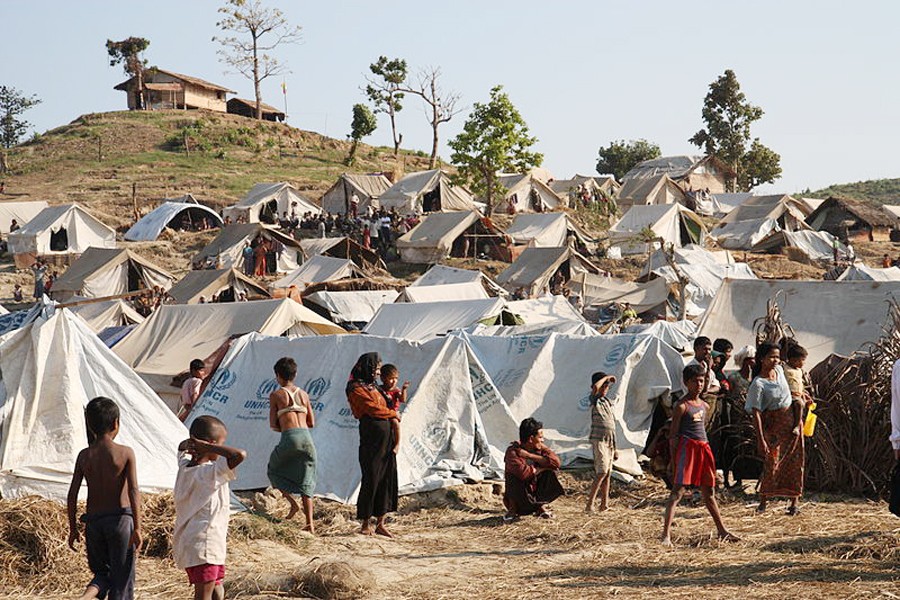
Published :
Updated :

Human security, a non-conventional security, denotes the human dignity. The term human security propagated by UNDP in the post-cold war era is intended to focus on individuals coming across values and goals such as dignity, equity and solidarity. It is apparent that the number of Rohingya refugees has crossed half a million since the beginning of the crisis on August 24, 2017. According to the United Nations High Commissioner for Human Rights (UNHCR), the Rohingya issue has been a textbook example of ethnic cleansing navigated by the civil-military administration of Myanmar. Influx of Rohingya refugees has been in Bangladesh since the 1970s and their number has surpassed 500,000. Strangely, Bangladesh is now hosting about a million Rohingya refugees. That causes a serious concern about human security. Experience suggests that the Myanmar government has been very reluctant to take back their nationals, the Rohingya, despite hectic diplomatic efforts of Bangladesh government. It gives the impression that the repatriation of Rohingya people to their homeland will be ambiguous in coming days and at the same time their stay in Bangladesh might be continuing for a longer period of time. What we could perceive is: providing basic provisions of their life like food, shelter and healthcare has been the utmost priorities at the moment and also for the rest of the period until their return to Myanmar.
Prolonged stay will ultimately lead to a pitiable human security condition of Rohingya community. Mentioning stubborn Rohingya crisis as a potential threat to human security, UN agencies working in Bangladesh have made an appeal to the international community for adequate fund to provide them with basic supplies for survival. It is the experience of different countries which hosted refugees during many humanitarian crises that international supports lessen over time, if the refugee crises continue. In this kind of situation the decisive economic affliction of humanitarian support to the refugees falls on the host country. Security concern, particularly non-conventional (human security), is another challenge that Bangladesh is already facing and it will intensify further in the future with the influx of the Rohingya refugees over the years. The government of Bangladesh has been credited for providing them with various facilities, including shelter, food and medical care despite many limitations. Health security and food security have been the evolving challenges in the makeshift camps where refugees are living. Meanwhile, the government took many steps for resolving the Rohingya crisis while various forces, including the Armed Forces, police, BGB and RAB along with the civil administration, public representatives and general people were providing necessary services to the Rohingya.
Given their living space mostly located in Teknaf-Cox's Bazar areas, these areas are adjacent to the settlements of the local citizens. Once, many awkward incidents happened involving them. In the future, with the increasing number of the refugees sheltered close to the native citizens' settlements, there is the likelihood of increasing incidents that could aggravate the local social and cultural harmony. The other pertinent issue is the danger of environmental security as there is likelihood of widespread environmental degradation due to the settlement of the refugees in areas close to hills and forest lands. Human security is meeting a serious challenge in winter. It is certainly to the credit of the government and the people of Bangladesh that they have responded to this humanitarian crisis. The support of various UN agencies and other international allies and NGOs should also be acknowledged as a crisis of this multitude cannot be taken on by the host government alone.
Bangladesh is making every effort in a professional fashion to mobilise regional and global powers to work out an amicable solution to the crisis despite China and India siding with Myanmar on the Rohingya issue. We have noticed both countries have huge strategic and economic interest in Myanmar. Even Russia seems to be compassionate to Myanmar on this issue. The government of Bangladesh has been active putting diplomatic efforts to persuade Myanmar to repatriate the refugees. Bangladesh also should continue efforts to encourage other governments to stay engaged and address the pressing needs of these refugees.
The United Nations must coordinate and communicate with donors and other relevant stakeholders so that they come forward to solve this problem permanently by putting pressure on the Myanmar government to take back its citizens by creating a safe and secured environment.
However, the reality suggests that Bangladesh government may not succeed in sending all of them back at one go. Therefore, we may think of some long-term solutions to deal with this additional population in Bangladesh. Considering the gravity of sufferings Rohingya refugees face, humanitarian, political, law and order, security, development and environmental concerns must be prioritised. We are looking forward to the successful repatriation of the Rohingya people to Myanmar in a secured environment where they will not be haunted by the fear of persecution again.
The writer is Assistant Professor of the Department of Government and Politics, Jahangirnagar University and former UN Development Practitioner. Email: [email protected]


 For all latest news, follow The Financial Express Google News channel.
For all latest news, follow The Financial Express Google News channel.